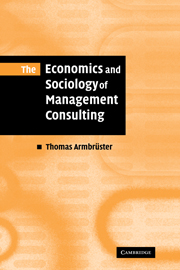Book contents
- Frontmatter
- Contents
- List of figures
- List of tables
- Preface and acknowledgments
- 1 Management consultancy viewed from economic and sociological perspectives
- Part I The mechanisms of the consulting market
- Part II The drivers of managing a consulting firm
- 6 Diversified services or niche focus? Strategies of consulting firms
- 7 Fostering reputation and growth? Marketing consulting services
- 8 The economics and sociology of knowledge distribution: organizational structure and governance
- 9 Gaining talent and signaling quality: human resource management
- Part III Conclusions
- References
- Index
7 - Fostering reputation and growth? Marketing consulting services
Published online by Cambridge University Press: 22 September 2009
- Frontmatter
- Contents
- List of figures
- List of tables
- Preface and acknowledgments
- 1 Management consultancy viewed from economic and sociological perspectives
- Part I The mechanisms of the consulting market
- Part II The drivers of managing a consulting firm
- 6 Diversified services or niche focus? Strategies of consulting firms
- 7 Fostering reputation and growth? Marketing consulting services
- 8 The economics and sociology of knowledge distribution: organizational structure and governance
- 9 Gaining talent and signaling quality: human resource management
- Part III Conclusions
- References
- Index
Summary
Service marketing and the market mechanisms
For some reason, the debate between economics and sociology has not touched the field of marketing very much. While a few scholars refer to institutional economics and others to the embeddedness approach, marketing has understood itself traditionally as a practitioner-oriented field in which theoretical debates give way to empirical research. From both economic and sociological viewpoints, the intangible nature and initial quality uncertainty of consulting services as experience or credence goods are the points of departure. As a matter of marketing, consultants must convey their sincerity and output quality, which places emphasis on the institutions of trust, reputation, and word-of-mouth effects (Greiner and Metzger 1983: 41–55). From an economic viewpoint, the question emerges of how these institutions can be worked on at low cost, and how information about service quality can be conveyed economically.
Among other considerations, the sheer size of a consulting firm may matter in this respect. As Besanko et al. (2000: 84–6) point out, larger providers have lower average costs of sending messages per potential client. Marketing efforts involve high fixed costs, and the larger the firm the more fixed costs can be spread across potential clients. Nevertheless, chapter 3 has shown that trust and word-of-mouth effects emerge primarily on the basis of client satisfaction. Only the delivery of high service quality can retain existing clients and lead to referrals to new clients.
- Type
- Chapter
- Information
- The Economics and Sociology of Management Consulting , pp. 140 - 151Publisher: Cambridge University PressPrint publication year: 2006



